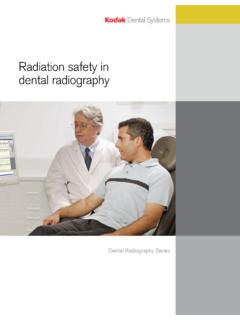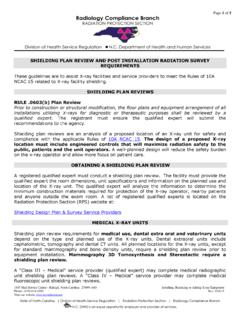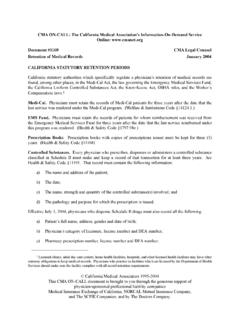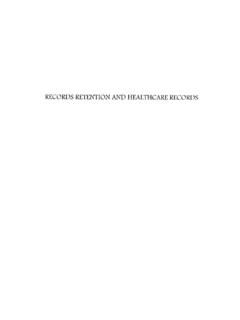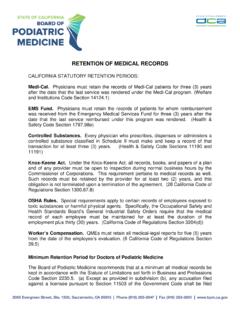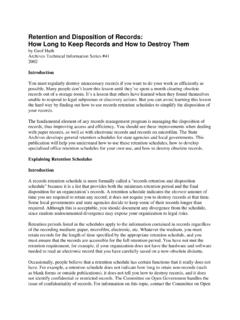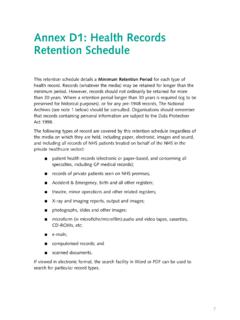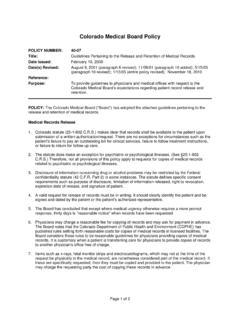Transcription of Retention of Medical Records - NC Radiation
1 Page 1 of 2 1645 Mail Service Center - Raleigh, North Carolina 27699-1645 Retention of Medical Records Phone: (919) 814-2250 Visit our website State of North Carolina | Division of Health Service Regulation | Radiation Protection Section | Radiology Compliance Branch NC DHHS is an equal opportunity employer and provider. Retention of Medical Records This document was developed with guidance from several organizations, agencies, and state Regulations. Specific Medical Records or, clinical information, that pertains to the patient and has been accumulated by the physician or his representatives are of interest. Medical Records include results of diagnostic tests, X-rays, physician notes, and any Records from prior treating or consulting physicians.
2 10A NCAC 13B .3903 North Carolina Department of Health and Human Services is charged with creating policy regarding "health care facilities", and is written primarily for hospitals. According to the DHHS Medical Records of a facility must be maintained for at least 11 years after an adult patient's discharge. Minor patients' facility Records are handled differently; they should be kept until the patient reaches their 30th birthday. North Carolina does not have a Medical office record Retention statute for free-standing" facilities, which are those facilities that are not hospitals, yet provide Medical or dental imaging procedures. The definition of "free-standing" also includes mobile services. Reasons to retain Records Medical Records should be retained in order to support treatment, and to provide a record of the treatment and diagnosis.
3 Previous films taken are very important for tracking the progression or reversal of disease states, and the efficiency of treatment. Medical Records are also needed for the comparison of previous and current Medical images. Previous Medical images may be necessary for a specialist or a physician providing a second opinion. Other situations for Retention include historical documentation, Medical research, and clinical trials. Health Maintenance Organizations and insurance companies may require copies of Medical or dental images, or reports, as part of an audit process for documentation of services rendered. Rules to live by or at least to consider It is advisable to keep the Records of adult patients for 10 years after their last contact with the practice.
4 For most patients under the age of 18, it is prudent to keep Records for 10 years after their last contact with the practice (same as adults) or four years beyond their 18th birthday, whichever is longer. For minor patients who will always be considered incompetent because of a mental or physical disability, Records should be maintained indefinitely or for five years after the patient has died. It is recommended that Records of deceased patients be kept long enough for the probate of the estate to close, which is usually five years. Page 2 of 2 1645 Mail Service Center - Raleigh, North Carolina 27699-1645 Retention of Medical Records Phone: (919) 814-2250 Visit our website State of North Carolina | Division of Health Service Regulation | Radiation Protection Section | Radiology Compliance Branch NC DHHS is an equal opportunity employer and provider.
5 Legal criteria- Medical Records should be retained as long as there is a possibility of legal action that could be sought by the patient, or by another party on behalf of the patient. No matter what the statute of limitation is, a physician should measure time from the last professional contact with patient. All Records that have been the subject of an incident that could lead to litigation, and all Records that have been requested by an attorney or administrative agency should be exempted from the general Retention policy. These Records should not be destroyed until the matter is fully resolved. If the patient is a minor, the statute of limitations for Medical malpractice claims may apply until the patient reaches age of majority. The Mammography Quality Standards Act of 1992 directs that mammograms and Medical Records are to be kept for at least five years, and 10 years, if the patient has had no other mammograms at that facility.
6 This could be potentially longer if it is mandated by state or local law, or there are mental and emotional disabilities. The necessity for the Records to be kept longer could also arise when the patient is unhappy with result of the study, or any time a patient threatens or files a lawsuit. Records of patient covered by Medicare or Medicaid must be kept at least five years. Failure to retain Medical Records for a sufficient period of time could be considered negligent if a patient were injured by treatment that would have conflicted with recorded information had it been available. Finally, Records should be kept indefinitely in riskier situations. These include, but are not limited to, any undesirable outcome, where the patient was or might have been legally incompetent at the time of treatment, or becomes legally incompetent thereafter (including cases involving brain damage, Alzheimer's Disease and other mental and emotional disabilities).
7 Facilities destruction policies Facilities should have a written record Retention and destruction policy in place. Staff should be familiar with this policy to ensure uniform record handling and minimize claims. When disposing of Records , the practice should maintain some basic information, including the patient's name, date of birth, Social Security number, dates of first and last visit, and general problems and procedures done. Destruction of Records must be accomplished in a manner that protects the confidentiality of the documents being destroyed. Documents should be shredded or burned rather than simply disposed of in regular garbage. The federal Health Insurance Portability and Accountability Act of 1996 gives patients the right to access their own Medical Records .
8 Post-HIPAA, the best practice is to require the patient to sign a HIPAA Authorization, requesting a copy of the Medical record . Requests for deceased or incapacitated patients Records Physician practices should not assume that they are free to give copies of a deceased patient s Medical Records to an attorney or family member. If the individual is legally unable to act, such as after death, then a physician s practice may disclose the individual s Records only to the individual s, "personal representative," as defined in HIPAA.

